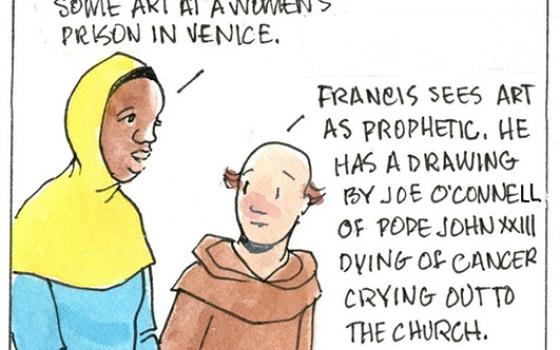BEING ABOUT BORDERS: A CHRISTIAN ANTHROPOLOGY OF DIFFERENCE
By Michele Saracino
Published by Liturgical Press, $29.95
As a Cuban-American born in the Unites States, I grew up with a strong sense of being different. It is nothing I ever sought out. Yet markers of my everyday life, such as my parents’ thick accents and the black beans on our dining room table, quickly instructed me that I was not like most typical girls in the United States. This difference was a source of joy and pain throughout my childhood. Years later, as an academic I began to intellectualize that sense of difference. I found a home in the voices of Latino/a and feminist theologians that highlighted difference and diversity and the function of power within our culture’s sense of what is “normal” and what is different.
Having just finished reading Michele Saracino’s Being About Borders: A Christian Anthropology of Difference, I feel like I have found a new home. This excellent book offers a constructive theological anthropology that highlights difference as fundamental to our world today and our sense of self. The introduction of the book offers two significant claims for all of us to seriously consider. The first is that in a world where borders are constantly being challenged through technology and globalization, the complexity of human difference simultaneously becomes erased. In other words, we cannot erase the particularity of who we are as we become more interconnected as a human community. The second claim is that this book offers an affective understanding of theological anthropology; Saracino does not want emotion to be subordinate to reason.
Chapter two examines affective theological claims for navigating border life. Saracino shrewdly points out that just because we are encountering difference at exponential rates does not mean that individuals are not having negative reactions to it. The encounter with difference can and should be difficult and challenge our sense of self. Christians must acknowledge the interconnectedness of human life, for an awareness of hybridity can promote empathy, what Saracino describes as an affective openness to others. Chapter three examines interpersonal border encounters, focusing on pregnancy and parenting as examples that highlight the porous nature of interpersonal borders. Saracino reminds us that Jesus at his core is on the border between God and humanity. His hybridity is theological in its salvific import to all.
The following two chapters focus on the current global context, examining Jewish-Christian relations and international border disputes. Saracino also examines our sense of self here in the United States in a post-Sept. 11 context. She reminds us of the manner in which images and propaganda shape us and how we understand those whom we see as different. She calls us to see each other in each other’s stories. The final chapter of the book draws from trauma treatment as a foundation for elaborating a Christian anthropology of difference that highlights attentiveness, storytelling and respect.
As a Latina feminist theologian, I am not new to discussions of difference. Perhaps that is why I was so refreshingly surprised and inspired after finishing this book. Saracino is able to cast the question of difference in ways that speak to all of us as Christians, not just because we are part of a particular racial or ethnic group. I also appreciate the honesty of this text. Saracino, in ways that other authors have not done so previously, is very straightforward about the difficulties of difference, the fact that difference challenges us. Yet despite the difficulties of the encounter with difference, one ends this book with a sense of hope, calling us to be affective and compassionate in our encounter with others.
[Michelle A. Gonzalez is assistant professor of religious studies at the University of Miami.]







